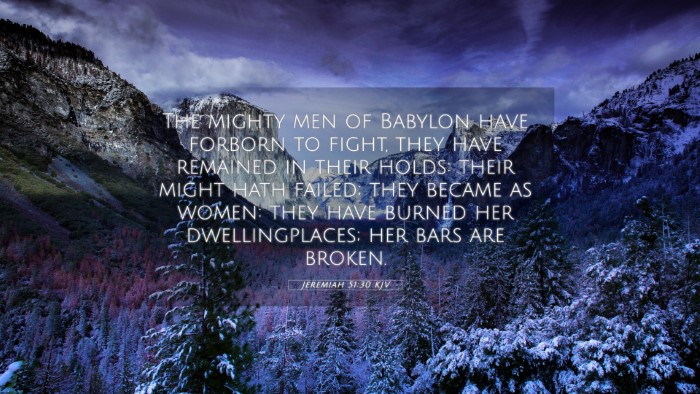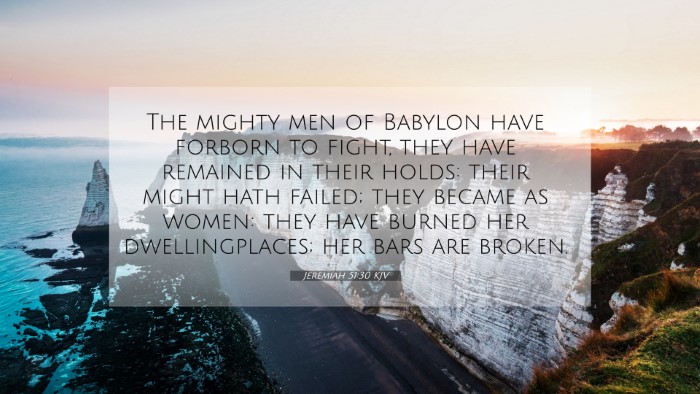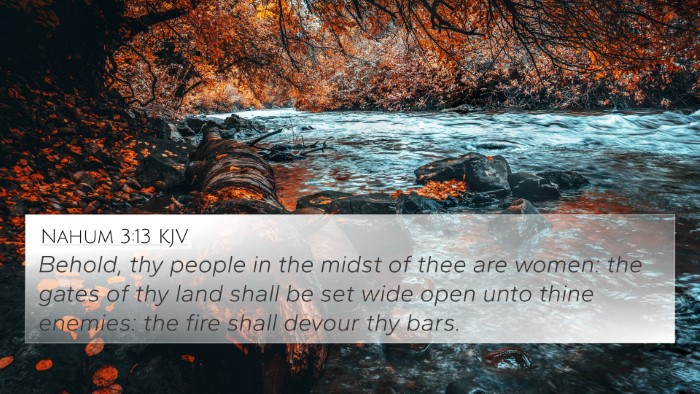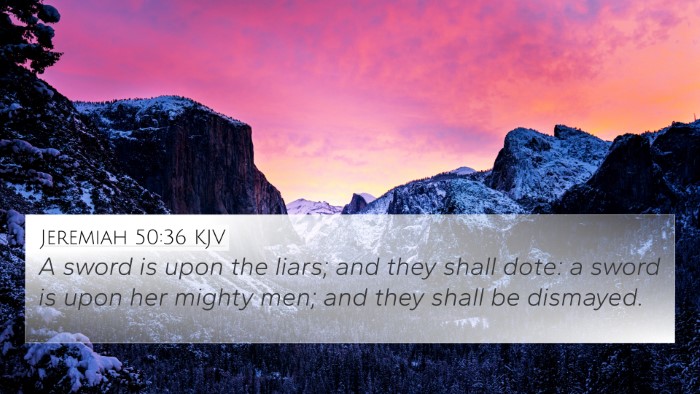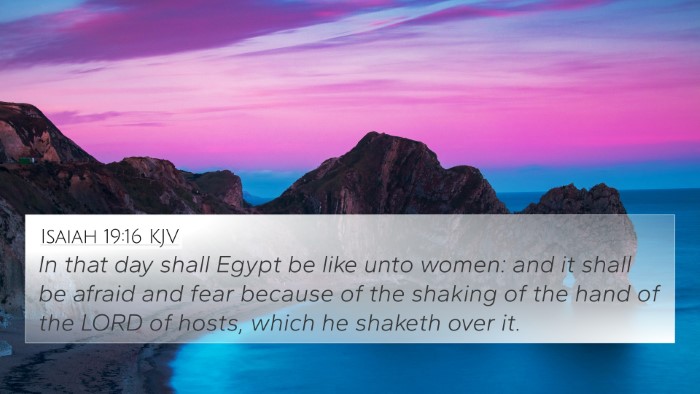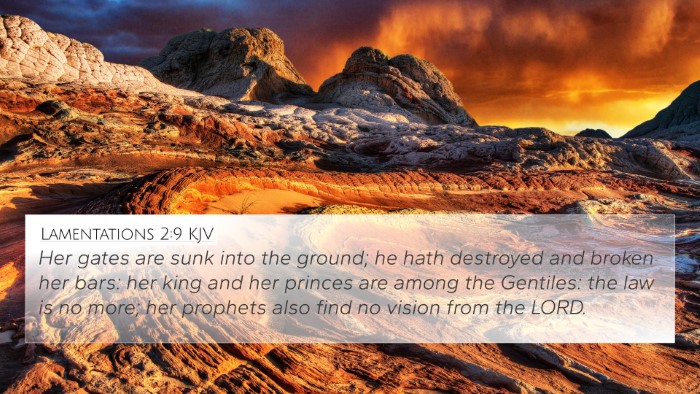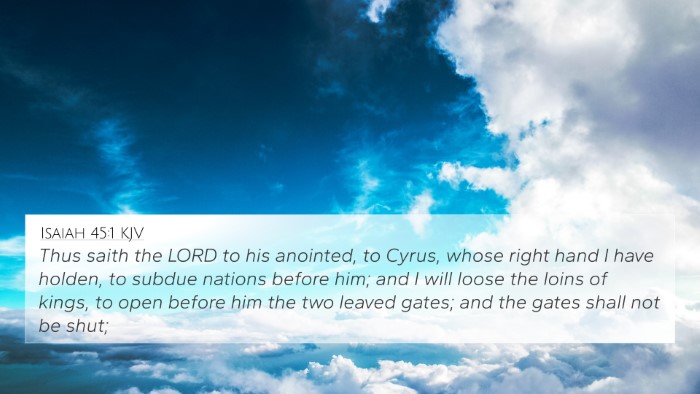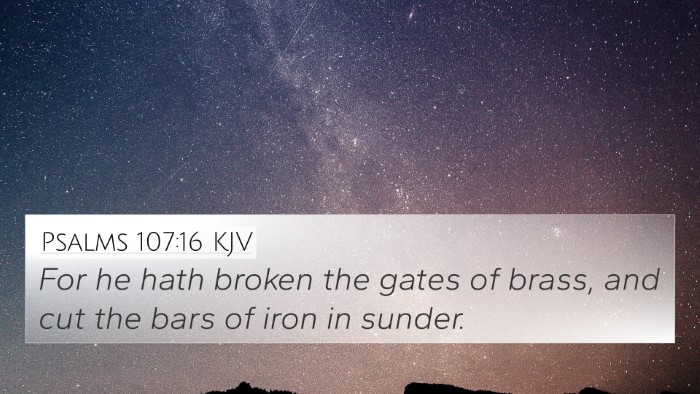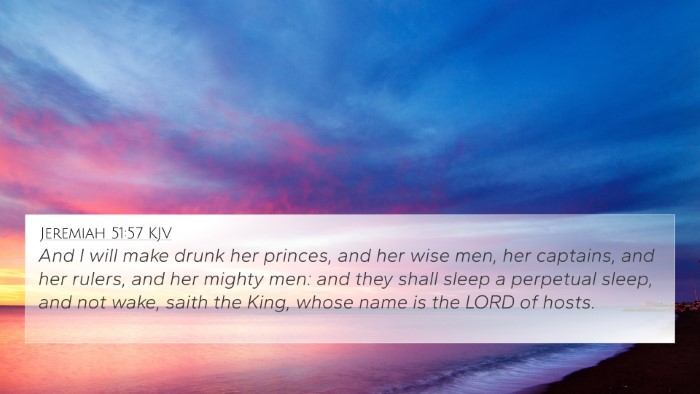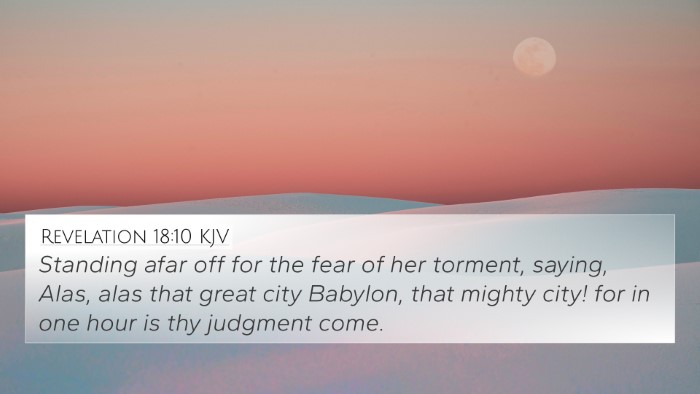Understanding Jeremiah 51:30
Verse Reference: Jeremiah 51:30
"The mighty men of Babylon have ceased fighting; they have remained in their strongholds; their strength has failed; they have become like women; they have burned her dwelling places; her bars are broken."
Summary of Meaning
This verse depicts the downfall of Babylon, emphasizing the end of its military strength and the resulting vulnerability of the city. The imagery contrasts the once powerful warriors with women, symbolizing weakness and defeat. The destruction of their strongholds and bars illustrates the total collapse of Babylon's defenses, marking a pivotal moment in the prophetic narrative of Jeremiah.
Insights from Public Domain Commentaries
-
Matthew Henry:
Henry posits that this verse illustrates the fulfillment of God's judgment against Babylon. The once proud and formidable kingdom is depicted as having lost its courage and strength. The language employed indicates both a physical and psychological collapse, where the warriors' inability to fight reflects divine intervention in the affairs of nations.
-
Albert Barnes:
Barnes elaborates on the comprehensive nature of Babylon's defeat. He highlights that the "mighty men" refer to the elite warriors who, in their cowardice, are stripped of their valor. The phrase "they have become like women" is a metaphor for their loss of strength. This imagery reinforces the extent of their humiliation, emphasizing that even the greatest powers are subject to God's sovereign will.
-
Adam Clarke:
Clarke focuses on the implications of the destruction of Babylon's strongholds. The interpretation he provides notes the irony and tragic fall from power of the city. As Babylon had previously been a symbol of strength and rebellion against God, its utter desolation serves as a warning to nations and empires that defy the Divine order.
Interpretative Connections
This verse can be cross-referenced with several other biblical texts to enhance understanding:
- Isaiah 13:17-18: This passage speaks of the Medes' role in bringing about Babylon's downfall, reinforcing the notion of divine judgment.
- Revelation 18:2: The prophetic destruction of Babylon in the New Testament mirrors its desolation in the Old Testament, highlighting themes of divine retribution.
- Jeremiah 50:37: Similar imagery is used, indicating a connection in the portrayal of Babylon's military impotence and the judgment experienced by its inhabitants.
- 2 Chronicles 36:20-21: This text discusses the exile and desolation of Jerusalem, correlating with the judgment the Israelites experienced, paralleling Babylon's fate.
- Ezekiel 32:22-24: The fall of Babylon's royalty and strength is echoed, providing an intertextual dialogue between the prophets.
- Zechariah 5:5-11: This scripture provides insight into the fate of wickedness, likening Babylon’s downfall to the removal of sin from the land.
- Daniel 5:30-31: This account recounts the fall of Babylon under King Belshazzar, offering a historical context that connects back to Jeremiah's prophecies.
- Luke 21:24: A New Testament reflection that addresses the fate of Jerusalem, linking it to the broader theme of divine judgment akin to that faced by Babylon.
- Psalm 137:1: The Babylonian exile of the Israelites demonstrates the consequences of defiance against God, adding another layer to the understanding of Babylon's fate.
- Matthew 24:2: Jesus speaks of the temple's destruction, paralleling the devastation of Jerusalem and Babylon, connecting themes of judgment and prophecy.
Thematic Connections and Cross-Referencing Tools
Understanding these connections between Bible verses helps illuminate the themes of judgment, humility, and divine sovereignty:
Effective tools for Bible cross-referencing, such as a bible concordance or a bible cross-reference guide, can provide additional insights into scriptural passages. By utilizing methods for cross-referencing Bible study and identifying connections between Old and New Testament writings, one can develop a deeper understanding of biblical themes.
Resources available for further study might include a comprehensive Bible cross-reference manual or online platforms focusing on scriptural cross-referencing. Such tools can assist users in discovering bible verses that relate to each other and aid in developing a comparative Bible verse analysis.
Conclusion
The interpretation of Jeremiah 51:30 reveals the profound truths about the vulnerabilities of prideful powers, emphasizing the high cost of turning away from divine authority. By exploring cross-references and engaging in cross-reference Bible studies, individuals can gain insightful perspectives on how these ancient truths remain relevant in contemporary faith discussions.

